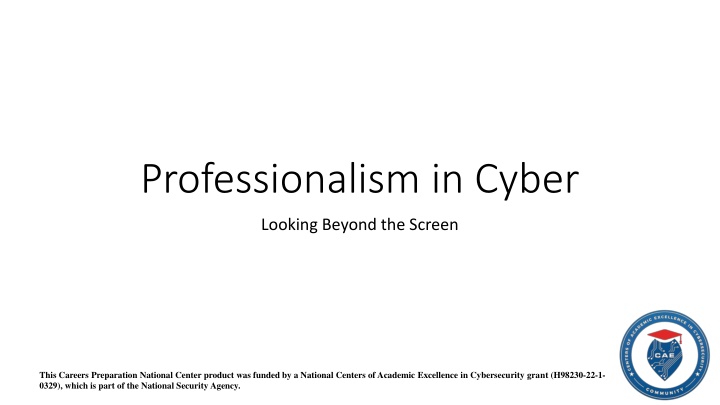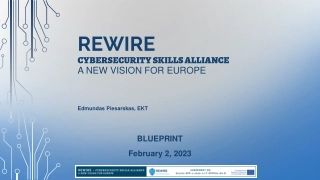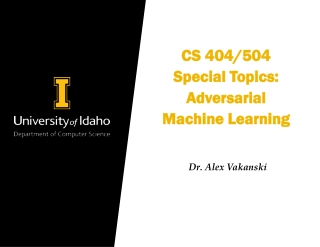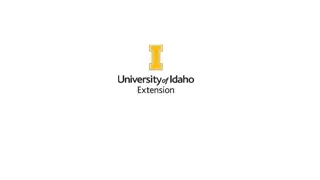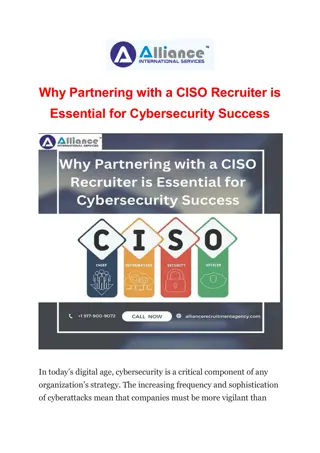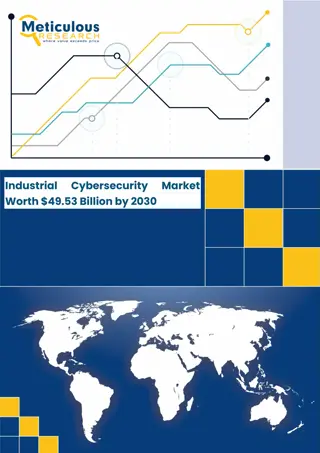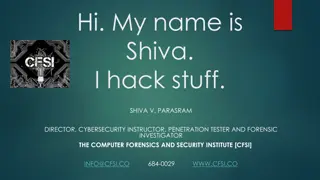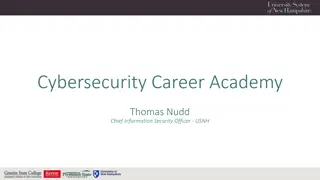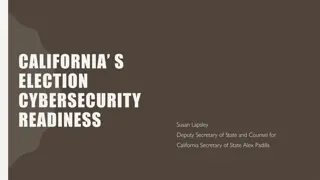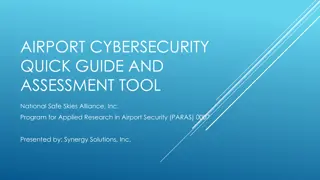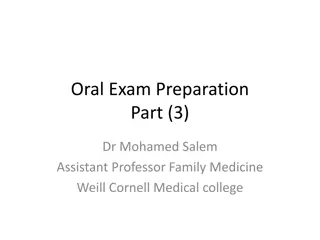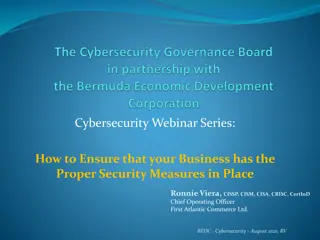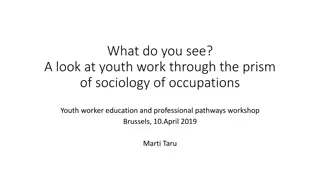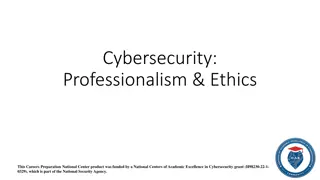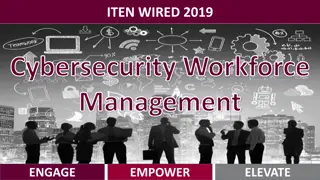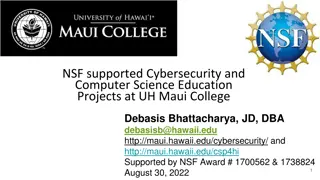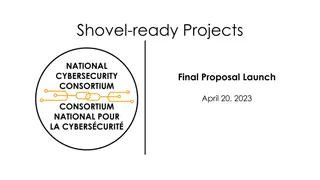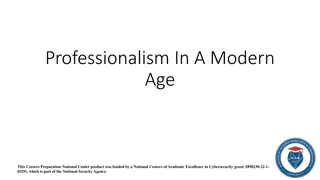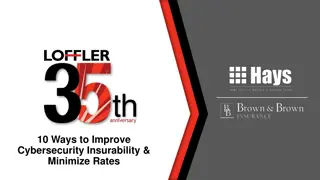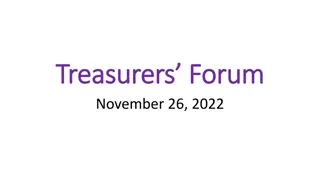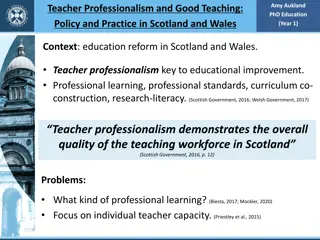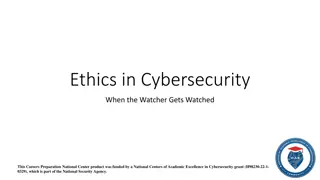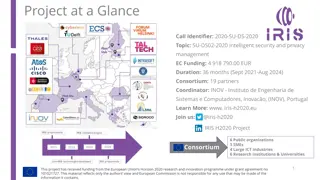Professionalism in Cybersecurity: Developing Essential Skills
Explore the importance of professionalism in cybersecurity, focusing on responsibility, integrity, and effective communication. Learn how to enhance your skills through practice and continual development, preparing for the competitive job market in cybersecurity. Discover the significance of conducting oneself with excellence and accountability while arming yourself for success through networking and mentorship opportunities.
Download Presentation

Please find below an Image/Link to download the presentation.
The content on the website is provided AS IS for your information and personal use only. It may not be sold, licensed, or shared on other websites without obtaining consent from the author.If you encounter any issues during the download, it is possible that the publisher has removed the file from their server.
You are allowed to download the files provided on this website for personal or commercial use, subject to the condition that they are used lawfully. All files are the property of their respective owners.
The content on the website is provided AS IS for your information and personal use only. It may not be sold, licensed, or shared on other websites without obtaining consent from the author.
E N D
Presentation Transcript
Professionalism in Cyber Looking Beyond the Screen This Careers Preparation National Center product was funded by a National Centers of Academic Excellence in Cybersecurity grant (H98230-22-1- 0329), which is part of the National Security Agency.
***BREACH ALERT*** Welcome! Your team has been notified of a breach! Early reports state that your files were found linked to a google drive on twitter. Sensitive information including customer s credit card numbers have been confirmed missing. Presently, nothing else has been reported stolen. No intrusion detection system went off, but your EDR system went off yesterday when an employee in maintenance plugged their USB from home into their desktop. Your team s task is to respond to the incident. Create a 3-5 slide presentation to give to your manager who is coming in 15 minutes. The presentation shouldn t last longer than 7 minutes.
WIHTCATS (Professionalism in Cybersecurity) Professionalism The act of conducting oneself with responsibility, integrity, accountability, and excellence. This includes the ability to communicate effectively and appropriately. The job market is competitive And getting increasingly competitive Professionalism is a combination of qualities That you must continually develop You may hear about soft skills or non-technical skills these are usually ways to describe professionalism So you probably already have the skills!
Developed Skills Think: Sports Teams Clubs Beta Club/Honors Volunteer Work Extracurricular activities Nature vs. Nurture Nature (internal) + Nurture (external) = You Coupled with a growth mindset (goals) + lifelong learning (drive) Opportunities will open up! They are fun! Yes & They Build Professional Skills! What does all of these have in common?
Practice Makes Better Not Perfect A professional demeanor, reliability, even a well-kept appearance takes practice Perfection is not a reasonable goal here But you should work to get better at here Here s how: Arrive on time (appropriately for the event) Dress appropriately Practice basic manners (yes ma ams and no ma ams) It still has value Communicate effectively You don t have to talk but be sure to document and participate Remain calm under stress (Practice!)
Arming Yourself Its a Competition As mentioned prior! This means you have to work on your craft Attend Job Fairs Network Reach out to Mentors Network Participate in events/competitions/conferences/etc. Network Network Why network to arm yourself? 2 Reasons: 1. It gives you first hand knowledge of what skills you need to do the job you are working towards (learn) 2. It shows determination & drive, this helps to build relationships as well potentially opening doors! Great Things Come From Hard Work & Perseverance. - Kobe Bryant
Activity: Network Engineering Networking (not the IT version) requires a bit of preparation, are you prepared? When you go to a networking event do you have the following: Business Card (bring a combination of physical and virtual) Make it yourself or use a service Elevator Pitch Not physical but should be a 30-60 seconds Not a Sales Pitch, but an invitation to continue to conversation Make your intentions clear Prepared Questions Universal (but not repetitive), have a good rotation Resume, Portfolio & Samples of Work Be sure to ask for a card or contact to follow-up Of course professional attire, positive attitude, open mind Take 15-30 minutes to review this checklist, see what you have, what you don t make a list to work on making/acquiring later. Discuss with the person next to you, where you are and what your ideas are moving forward. Speaking it has a different impact than keeping it to yourself.
Welcome Back! We hope your lunch was good! Did you network? Talk about what you have with others? Or did you start working on filling that list you made in the activity? Well, we are going to continue and talk about the differences between Resumes & Portfolios
Resumes & Portfolios You ve probably heard about Resumes & Portfolios and maybe even heard them as being interchangeable. They aren t interchangeable as they are 2 distinct things. Resumes Typically no longer than 1 page or 2 Should only contain information that relates to the position you re applying to (yes, you need to edit your resume each time) Typically includes: Professional Summary Work Experience Skills Education Portfolios Is a collection of information and material that gives visual examples of your work Provides samples and should include a variety of artifacts Typically Includes: Statement of Originality Career Summary Philosophy Statement Brief Bio Resume Work Samples Created websites may be used in lieu of a Portfolios
The Value of Being Able to Discuss You Your resume and/or portfolio may get you in the door, but it s your communication skills that will ultimately land you the job Why so much emphasis on communication? Because your interview is probably going to be a conversation Or it should be Whether a job interview, networking event, even social situations (this is why being professional in public is important) you need to know how to talk about yourself. Remember you aren t selling yourself, you are sharing the light that is your passion with others Being able to discuss you professional ambitions as well as your past experiences allows others to get to know you at a deeper level That enables them to start to see if you would be a good fit for the workplace
Activity: Relating Soft Skills to Technical Skills We ve focused on the importance of soft skills But how do they translate in the work force In the next 10-15 minutes, read the short article: Soft Skills can be just as important as technical skills Soft skills can be just as important as technical skills | ASCE After we will discuss how these two types of skills relate As well as discussing how the skills you developed can relate to potential job roles you may be interested in Soft skills get little respect, but will make or break your career. Peggy Klaus
Here You Are! Not Much Different BUT Different! You should have a better understanding of what it means to be a professional in the field It s more than what you do technically It s what you do beyond the screen as well Being well-rounded isn t just about working on your own personal traits It is also about being able to manage, respond, and interact with the environment and those around you
Remember Your Audience When applying to jobs, you must remember your audience Yes, a lot of places use filter systems Remember the market is competitive People apply from out of state, out of country Companies don t have time nor do they want to use resources on going through every single application Be honest but Tailor your resume to the job description If you aren t honest, you ll eventually be found out and lack of trust follows you Quality over Quantity Don t make your resume long Grab their attention Research different resume formats for the type of job Capture their attention in the opening Resumes should be living documents, no two job postings should receive the exact same resume. The job posting may be the same, but the description (what they are actually looking for) may be different.
Remember Your Manners Manners include: Yes/No, Ma am/sir, but they do not stop there when we are talking about professionalism. Manners include, but are not limited to: Preparation & Research This is also practicing your speaking and researching the organization s missions and goals Dress Appropriately Punctuality Arrive 5-10 minutes before an in-person interview (15 if location is unsure or you aren t familiar with the place); 5 minutes before a video interview; on-time for a phone call Body Language It speaks volume! Engage Respectfully Active Listening Nod your head, give audible cues, engage in the conversation (ASK QUESTIONS) Follow-Up with further questions or with a thank you note, whether you get the job or not For Meal Interviews eat something light (and neutral in smells and spices) before arriving. Remember your table manners and etiquette, as it is a part of the interview process as well.
The STAR Method The STAR Method is an approach to answering behavioral interview questions. But it can also be used to highlight points on your resume, when asked about specific bullets or skills. If you can relate a listed skill or duty to an actual experience this not only supports your point but also enhances your display of professionalism and your ability to perform. STAR Method: Situation or problem you faced Task you were involved in Action you took to complete the task Result or positive outcome from your actions (negative if the honesty is what they are looking for)
Activity: Mock Interview This was probably a given, but we are going to work on our interviewing skills (as well as everything else we have worked on!) Take 10-15 minutes to gather what you have Share your resume with your instructor (or each other) After sharing you will meet with your instructor to interview (or pair off and interview with someone who hasn t viewed your resume, give them time to go over it and come up with some questions) Provide feedback to each other We will discuss the whole process at the end
Conclusion Thank you for attending this workshop! We hope that you had a wonderful time and learned a lot! We also hope that you feel better equipped with tools to develop your professionalism Remember, you have the skills already, now is the time to identify them and continue to develop them! Professionalism is something we have to practice at, it s the only way we can continue to improve And lead to better opportunities
